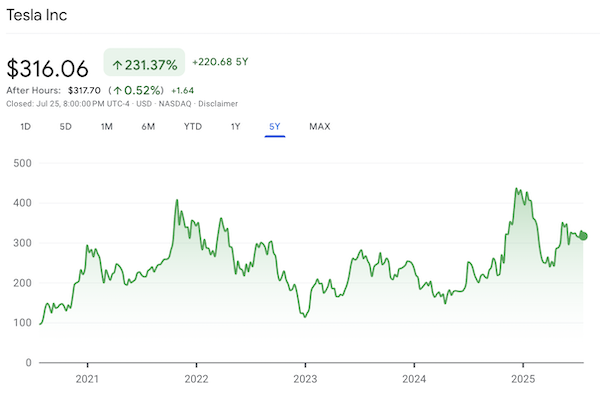Sign up for our free daily newsletter
Get the latest news and some fun stuff
in your inbox every day
Get the latest news and some fun stuff
in your inbox every day
Houston, we have a problem. One of our recommended portfolio stocks is in trouble.
We own Tesla because it's an iconic company that pioneered modern electric vehicles and is run by one of the most innovative people alive, Elon Musk. Unfortunately, it's down over 30% from its December 2024 peak, while the broader market is smashing through all-time highs.
It's revenue is declining, margins are compressing, and cash flow has dried up. There have been a number of senior staff departures.
Tesla categorises its business into three divisions. Automotive is the biggest, contributing 74% of revenue, and includes sales of electric vehicles (models S, 3, X, Y, and the Cybertruck).
That's the part of the business that is crashing. Global deliveries fell 13%, the steepest quarterly drop ever. The lack of new models is starting to show, and the brand has suffered because of Musk's political antics. To make matters worse, the Federal government will soon retire the $7 500 consumer tax credit for US-based EV buyers.
Sales in Tesla's second biggest market, China, have also been sliding, despite price cuts. Tariffs and escalating competition from BYD and Xiaomi are deeply concerning.
Services revenue is next at 14%, and includes sales from software, vehicle servicing, and the Supercharger network. This is the division that is supposed to be the future of the company. More on that below.
Energy generation and storage is the last division at 12% of revenue and includes utility-scale battery projects, the Solar Roof and Powerwall. That unit is actually doing well.
Tesla had a significant profit booster in the past from selling regulatory credits to other automakers that needed to offset emission penalties, but those are being eliminated. Tesla's revenue from third-party credits dropped by 51% year-on-year in the second quarter. Analysts now expect credit revenue to fall 40% next year and vanish by 2027.
387 Vestact clients own Tesla shares, which is about 36% of our entire customer base. It's been a frustrating share for the last few years. When it's going up, you are annoyed you don't own more, when its going down you wonder why you still own so many.
Elon Musk is a genius, but also a deeply divisive character. He just takes on everything, without a second thought. Sending rockets to Mars is great, but why does he need to own Twitter? Weeks after promising to focus more on Tesla after dropping out of DOGE (Department of Government Efficiency), he announced a new political movement: the America Party. Another silly distraction.
Tesla's "bull case" is premised on autonomous driving solutions (including robotaxis), the robotics division that makes Optimus machines, and various AI projects.
Despite a slow start in Austin, Musk claims the Tesla robotaxi network could eventually add $5 to $10 trillion to their market cap. That seems a bit far-fetched, since Uber, by comparison, has 170 million monthly active users and nearly half of the global ride-hailing market share, but is worth under $200 billion.
The problem with Musk's projections for driverless cars is that he's not the only one eyeing that market. For now, Google-owned Waymo remains far ahead, having completed more than 250 000 paid, fully driverless rides per week across four US cities. Amazon's Zoox and an Uber/Lucid partnership will be running by 2026.
The Tesla 5-year share chart (see below) does not look too bad. It's market cap is still around $1 trillion. However, it trades on a price to earnings ratio of 188. Investors are being asked to pay a sky-high multiple for financial performance that has stunk for the last two years. They're buying hope.
Should we just kick Tesla out of our portfolios by selling them outright? Let's not be too rash. But for now, we are reluctant to buy Tesla shares for new clients, or to add to the position of those who own it already.
If Tesla is more than 10% of your portfolio, you might want to consider reducing that to a more sensible level, given the risks described above. If you own them and you are concerned, send us an email and we'll give you some direct advice.
